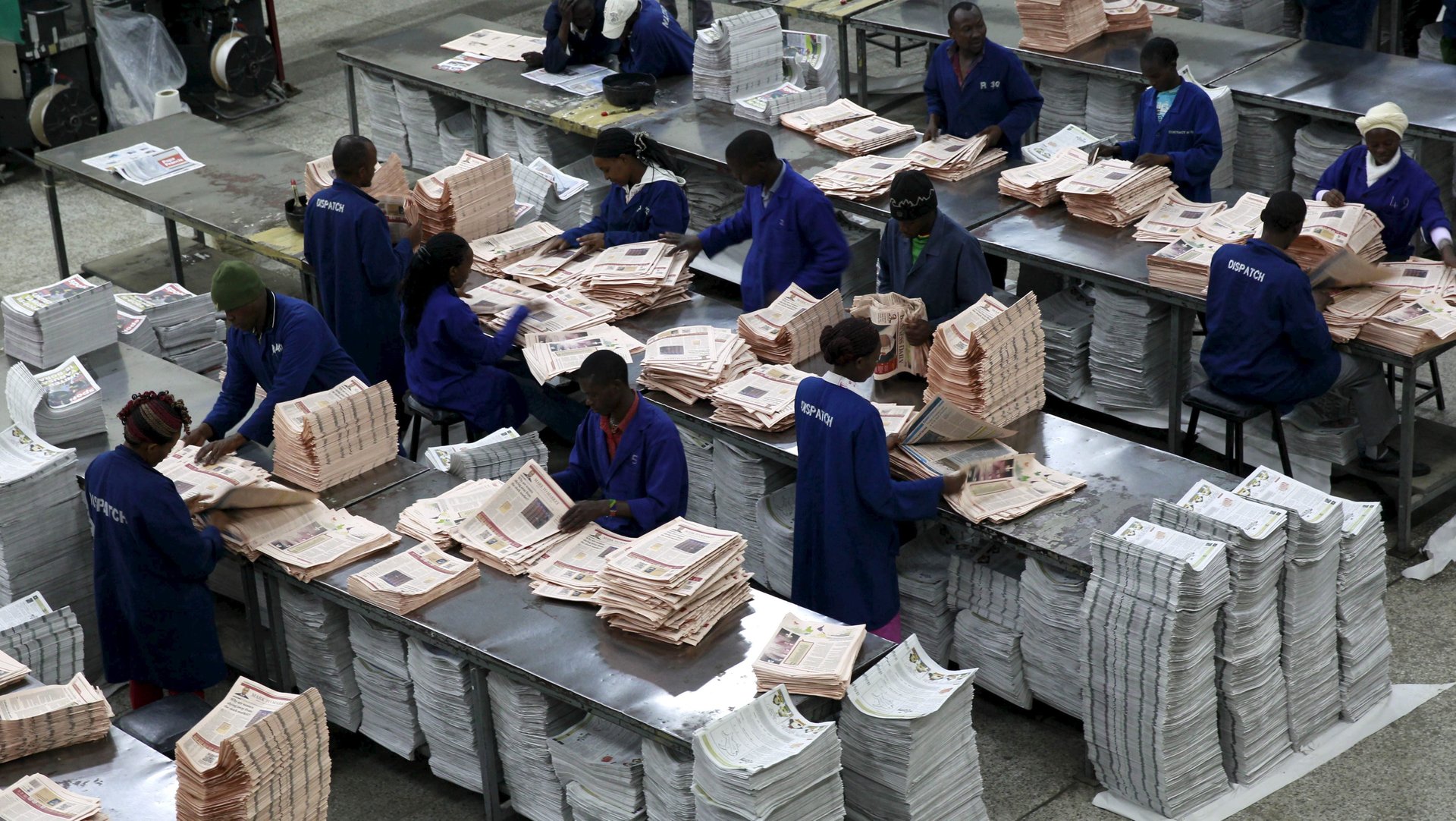Kenyan journalists have been dealing with a violent run-up to next year’s elections
Last month, Julius Kariithi was attacked by over 15 security guards with kicks and batons. The correspondent with Kenya’s Citizen TV had been covering a protest by primary school pupils against a decision by a local agricultural company to reclaim a piece of land it had allocated the school ten years ago.


Last month, Julius Kariithi was attacked by over 15 security guards with kicks and batons. The correspondent with Kenya’s Citizen TV had been covering a protest by primary school pupils against a decision by a local agricultural company to reclaim a piece of land it had allocated the school ten years ago.
“My pair of trousers was torn apart and I suffered a dislocated knee. The camera and my laptop were destroyed and I lost my recorder,” he tells Quartz.
Kariithi had become the latest victim of a growing number of journalists in Kenya, who have found themselves ending up as victims of intimidation or attacks as local politicians and their sponsors begin to position themselves for the 2017 general elections. Quartz spoke with several Kenyan journalists who said that these incidents have intensified over the last three or so months.
Long seen as having a safe operating environment for journalists, Kenya is now fast gaining a reputation for harboring hostility against the press. Episodes of journalists being harassed, beaten up or killed have escalated to unprecedented levels in the last three months. Journalists have been attacked by politicians, the police, government officials and members of the public, with others losing their lives.
Just last month, freelance photographer Dennis Otieno was gunned down by three men seeking to recover from him a certain ‘sensitive’ photo he had taken earlier in the day. Another correspondent Joseph Masha of the Standard Group was claimed to have been poisoned when he shared a meal with a vocal politician one evening. The journalist collapsed and died moments after meeting the politician.
Journalism bodies such as the Media Council of Kenya say it’s been alarmed by the unprecedented cases of attacks against the journalists.
“The security and safety of journalists is now a major concern to us. Many incidents of harassment, intimidation, unexplained summons by the police, assault confiscation and breakage of cameras and equipment have been reported to us,” the Media Council’s chief executive officer Haron Mwangi tells Quartz.
He, however, outlines some of the reasons why such cases have intensified. Keen on guarding their reputation ahead of the Aug. 2017 general election, politicians have lately become intolerant of journalists, especially those that have remained independent and professional in their reporting.
Blaming the messenger
A section of journalists have also openly taken sides with certain political ideologies, with such political contests extending into the newsrooms where some would disparage those whose opinions they disagree with. Others would directly champion the interests of their political allies and acolytes, as a result, compromising their independence as journalists.
“The members of the public are aware of such trends and at times express their anger by assaulting journalists when those that they support are perceived to be negatively and unfairly represented in the media,” Mwangi says.
The public also believes some journalists have failed to be fair and honest in their work. Equally, officials have often castigated the media for irresponsible reporting and emphasized that there is no such thing as absolute freedom of the press.
A report released in July 2015 by the Committee to Protect Journalists (CPJ) observed that Kenyan officials were increasingly crafting legislations that undermine freedom of expression. This had made journalists more vulnerable not just to threats and attacks but also to legal harassment or judicial repression. Media houses on the other hand are increasingly being manipulated by advertisers, politicians or key shareholders by being told to tone down their criticism against the government, political or business cronies. Growing government pressure in the form of despotic laws, intimidation and threats to withdraw state advertising have resulted in a substantial decline reporting critical of the leadership of president Uhuru Kenyatta, says CPJ.
But, as Kenyans grapple with reports of high levels of corruption, insecurity, tribal politics and political intolerance in the country, journalists who routinely cover such and other sensitive issues are often subjects of harassment and attacks.
“Kenya has always been a democratic nation where the freedom of the press has been thriving. But, right now journalists are facing a lot of threats and this has us worried,” says Eric Oduor, secretary general of Kenya Union of Journalists (KUJ).
“But, we will not sit back and allow anybody to erode the freedoms that we enjoy as journalists,” Oduor says.
Yet, despite such assurances, the union is often frustrated by police’s failure to cooperate in launching and concluding investigations to bring culprits to justice.
“Our space is slowly shrinking as the media. There are some things I can’t write about. I’d rather not practice than risk my life again,” said Standard Group journalist Michael Olinga in an interview with Daily Maverick earlier this year. He was recounting a kidnapping ordeal he experienced at the hands of armed men who warned him against his reporting style.
Across many African countries, journalists face similar or worse aggressions in the pretext of silencing them for speaking truth to power. Journalists in East and Southern Africa experienced a sharp increase in political pressure and violence in 2015. Eritrea and Ethiopia were the two worst jailers of journalists in Sub-Sahara Africa in 2015. West Africa exhibited improvements with a reduction in attacks against journalists.